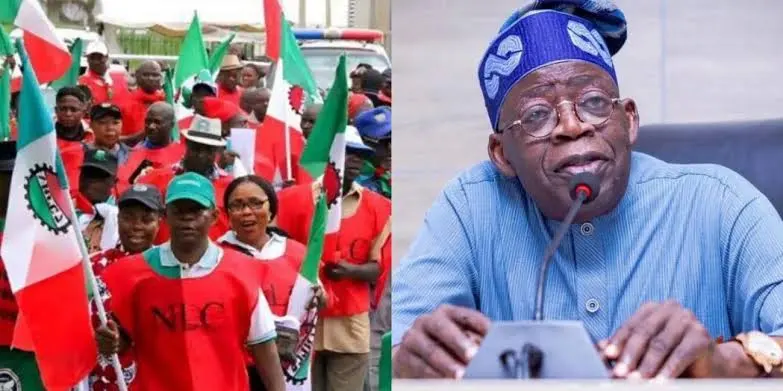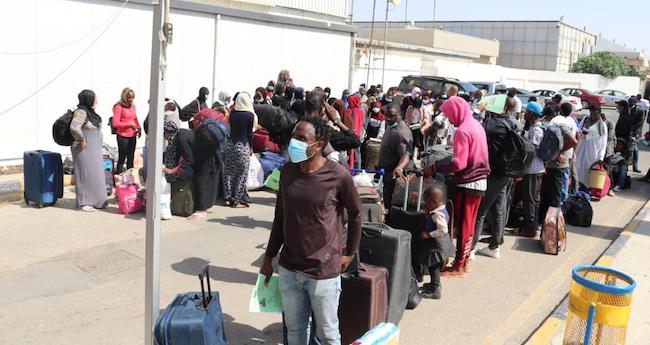*Pix above(r-l): PBAT and NLC members
PLEASE SHARE
Strong indications have emerged that President Bola Tinubu may announce the new minimum wage on May 1 in commemoration of the International Labour Day and backdate its implementation to April.
It wasgathered that the National Minimum Wage Committee was working to ensure that all negotiations regarding the new rate were finalised before then with the expectation that the President would announce the new minimum wage in his Workers’ Day address.
A member of the committee, who spoke on the condition of anonymity because of the sensitive nature of the issue, said, “By next week, the minimum wage committee will meet again. It’s a continuous meeting. That is a meeting where all the reports from the zonal public hearings will be collated and reported, and then, you know, that will also give the committee the direction to work with.
“Our target is to ensure that Mr President announces the minimum wage by the 1st of May, which is the Workers’ Day, for it to take effect from April. So, we are working to meet the timeline.”
When reminded that the current minimum wage of N30,000 would cease to be valid on March 31, the committee member said it was unlikely that the new rate would be ready before then, adding that there was still a long way to go in arriving at an acceptable minimum wage for the country.
The source stated, “We have not got to the negotiation point yet. When you finish with the zones, it is the aggregate of what you collect from the zones that will determine the direction of the main committee. Now that we have finished with the zones, when the committee meets, it will collate all the positions of the zones and committee members.
“The positions of the NLC, TUC, NECA (the Nigeria Employers Consultative Association) and the government will be looked at. Then, we will look at the aggregate, find a percentage, and arrive at what will be agreeable.
In January, the Federal Government inaugurated the tripartite committee responsible for deliberating on the national minimum wage.
Vice President Kashim Shettima inaugurated the 37-member panel at the Council Chamber of the State House in Abuja.
Comprising representatives of the federal and state governments, the private sector, and organised labour, the committee’s mandate is to propose a revised national minimum wage for the nation.
During zonal public hearings in Lagos, Kano, Enugu, Akwa Ibom, Adamawa, and Abuja, workers in the North-West requested N485,000; North-East, N560,000; North-Central, N709,000 (NLC) and N447,000 (TUC); South-West, N794,000; South-South, N850,000; and South-East, N540,000 by the NLC and N447,000 by the TUC.
However, the Adamawa and Bauchi state governments suggested N45,000 as the new minimum wage.
The NLC on Friday said governors who fail to implement the new minimum wage when it becomes a law would be breaking the law, noting that it was working towards ensuring that tougher sanctions would be meted on such governors.
While the Federal Government had never defaulted in the payment of minimum wages, governors had never performed up to the task, says Benson Upah, spokesman for NLC.
Upah said, “I want to tell you that any state that refuses to pay the new minimum wage will be breaking the law because it will be a national law. The present minimum wage of N30,000 was consensual, so the governors who have refused to pay are breaking the law.
“One of the things we are trying to do with the present negotiation is to ensure that enough sanctions are provided. We are going to ensure that sanctions are sufficiently tough to deter such criminally-minded governors. When it comes to the minimum wage, the Federal Government has been adhering. We really can’t recall a situation of default in terms of payment of the minimum wage by the Federal Government.
“Where we had challenges in the past was about defiant governors and their number has been in the minority.”
Similarly, the TUC said it was unacceptable for the governors to undermine the payment of living wages to the workers with their divide-and-rule tactics, adding that state governments had no excuse to do whatever would be agreed on as the minimum wage since they now had more money available following the removal of fuel subsidy.(agency)/PLEASE SHARE





